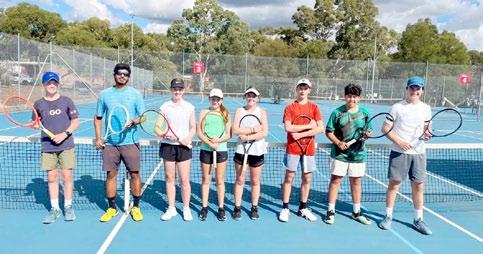
7 minute read
topping South Australian tennis – again
from 2023-07 Sydney
by Indian Link

35-year-old Ashwin Vijayaragavan was recently named South Australia’s 2022 State League tennis player of the year, the second year in a row the former tennis professional has taken out the prestigious honour. It’s the latest achievement in a remarkable career that has seen Ashwin reach heights that many tennis players dream of – dreams which Ashwin now aims to fulfil for juniors, through his Adelaide Rising Stars Tennis Academy.
Born in Doha, Qatar, Ashwin’s introduction to tennis was tenuous, at best. “It was just an extra-curricular activity for an hour,” he recalls. “We moved to India when I was 10, so I played a lot of cricket – because it’s India! So, tennis was nothing big for me.”
But as Ashwin started regularly watching his brother play tennis, cricket increasingly took a back seat. “My first coach [former Indian national player, Ilyas Ghouse] pushed me further into the game. I wasn’t the most talented compared to other kids my age, but my work ethic was up there with the best, and Ilyas enjoyed working with me,” says Ashwin.
Ashwin’s rise was rapid. By the age of 14, he was one of the top 5 players in India in his age group, and by 16, he was playing in the ITF World Tennis Tour junior circuit, including in the junior Australian Open in 2007 under the tutelage of Ganesh Raman, who Ashwin describes as a “father figure”.
Although grateful for his own opportunities, Ashwin’s assessment of India’s tennis system is frank: “The only thing working in India is doubles,” he says.
“The notion is that no Indian can do well in singles. To my knowledge, we’ve only really had Leander Paes and Somdev Devvarman make it big.”
Ashwin does not put it down to a lack of facilities, or access to quality coaching – but a disjointed system that sees tennis facilities located 30 minutes away from fitness facilities. “It’s just how the system has always been, and the [All India Tennis Association] hasn’t been very helpful. It’s one of the reasons we can’t ever make a successful singles player,” he rues.
After finishing school, Ashwin earned a scholarship with the University of Texas, where he studied Finance while reaching a highest ranking of 46 in the NCAA, widely regarded as the best college sport system in the world. But it was about more than just tennis: “My parents thought I could benefit from that journey, and learn certain things without their help. In India, you always look up to someone to help, but that sense of independence is missing,” he acknowledges.
Turning pro at 21, at various stages Ashwin reached the top 500 in the world, was a hitting partner for Novak Djokovic, and was also selected in India’s 2013 Davis Cup tennis team.
“As a tennis player, that’s one of your biggest dreams. When I was just six years old, I got to hit with Leander Paes in Doha. I was stoked to be playing on the same Davis Cup team as him 15 years later,” recalls Ashwin.
“Playing in a team is always special – there are people cheering for you, someone is always telling you what to do, it automatically gives you energy,” he describes. “But when you’re playing tournaments by yourself, you feel lonely –you have to fight by yourself, and it’s very difficult to motivate yourself.”
A lower back injury plagued the latter half of Ashwin’s career, and in the notoriously gruelling ITF circuit, saw him ramp up his coaching career, beginning in Sri Lanka with the junior Davis Cup and briefly turning to the Middle East.
It was only in 2016 that Ashwin arrived in Australia, to undertake a Masters in Sports Management at Deakin University. Later he moved to Adelaide with his partner Tania, where he took up a coaching job at Tea Tree Gully Tennis Club – which he credits to his mentor and club head coach Jason Todd. It was with Tania’s encouragement that Ashwin started playing for the club in select tournaments, and he has never looked back.

“Australia will always be very close to my heart. I did everything here without a lot of support, I had to build myself up. I wish I had this journey when I was a bit younger, but I’ve learned a lot in my time here – from being a player coach and now running a business of my own [the Adelaide Rising Stars tennis academy] training 60 or 70 kids. I felt like I was missing something before, but now I have my own identity,” he says proudly.
As a performance coach, Ashwin Vijayaragavan is better placed than most to pass on advice. His recommendation: “Don’t just get into tennis to become a champion. Enjoy it and play as much as you can, but the journey is huge – only 0.001% of people make it big. If you play only to become a champion, then you’re going to lose your way somewhere. Have fun, keep playing and then you never know what will happen.”

10

Online retreat starting on 25th October 2023 (HINDI) is about attempting to grasp this higher consciousness. That is precisely the purpose of spirituality. The course is set out in very clear and simple terms, with an emphasis on experience.
‘No problem can be solved from the same level of consciousness that created it.’ Albert Einstein
If you’re looking for advancement in your own life, if you need strength to raise your mind high above the daily trivialities, if you could do with clearer understanding of our very existence here, if you need practical steps towards transformation… then, this is for you.
Facilitator: Sister Ananya

For Ananya Tomar, her ultimate goal as a meditation teacher is to create an uplifting atmosphere. Starting October 25, Ms Tomar will host free Raja Yoga Meditation sessions Online in the Hindi language. Ms Tomar says her personal aim is that one person understands and starts practising meditation. “Meditation is like a big discovery,” she said. “I was spending my life really exhausted by changing things outside, changing my health outside and my finances, and it was like a big reveal, all the change happened from within.
“I train them to think to see that spirituality and higher consciousness are not the treasure of just a few, but are something that should help us all in our everyday lives. It’s a very
Ms Tomar, who works in the environmental sciences and sustainability sector, says the Zoom classes are designed so that anyone can join, whether they’re at the office or at home while radiating the positive insights gained in the classes to all their family members and housemates. “You can do this anywhere, any time, that’s the whole idea,” she said.
with Lakshmi Ganapathy
A performance artist living and working between Sydney and Canberra, SHAHMEN SUKU tells stories of cultural identity, gender roles, displacement and the kitchen through his drag alter ego, Radha.


What is it about cooking that made you want to incorporate it into your performances?
I think food is the great equalizer – everyone needs to eat, and that automatically puts everyone on the same baseline, and then you can use that to tell stories or current affairs. Once everyone’s on the same page, it’s easier to then break the boundaries and talk about something difficult.
What’s something from your Radha persona that’s made its way into Shahmen, or vice versa?
I use Radha to tell my stories and to explore food more, and it’s made me pay attention to family stories. I collect recipes to also to collect stories; I coined the term ‘pickling’ as archiving, how I share and record stories. I wouldn’t necessarily call an aunt to ask how she is, but I’d call to ask for a recipe, which would lead to other conversations – it infiltrates my life as Shahmen to explore these stories and connections with my family.
You did a show called ‘Midnight Masala’.
Are you a midnight snacker?
What’s your go-to midnight snack?
Depends if I’ve been out! I like a McSpicy Double, or a Filet O’ Fish Double, and then I get nuggets, so I get fish and chicken…and a hot fudge sundae!
Or if there’s chocolate in the fridge, I’m a chocolate person. The Tony’s Chocolonies Almond or Hazelnut with 80% Dark Chocolate is so good!

South Asians have been doing well on MasterChef recently – any cooking show plans?
I’ve only ever come close to being on one! I auditioned for MasterChef but didn’t go through, and I was going to apply again but then that season a Singaporean-Indian chef won and I was like, ‘all the South Asians are winning, I’m never gonna get in!’ I did get close to being on My Kitchen Rules last year, but I pulled out. I’ve been on ABC’s The Set, and I’ve done my own videos on Instagram, ‘Where you’d Radha be’ where it was like a panel show, so I think that’s the direction I’d like to go, a cooking talk show where you interview guests whilst they cook with you.
What's something that you're currently listening to/reading/playing/watching?
I’m on Soundcloud a lot listening to random mixes, and I don’t read, I love audiobooks! I’ve been listening to Theft by Finding by David Sedaris which is a series of his diary entries from the late ‘70s to early 2000s, paints a great picture of the past. I just discovered Gloam by Cole Pulice recently; it’s saxophone, but it’s trippy, which I never thought I’d like that much but it’s a great album.

What’s a word that you like in a South Asian language, and what does it mean?
I mean, it’s a bit predictable, but in Tamil ‘Saptaya’ or in Malayalam ‘OonuKazhicho’, which is ‘have you eaten’. They’re very simple questions but it’s asking a lot more than that - it’s everything, it’s ‘how are you and how’s your day’.
And finally: Soan Papdi or Papdi Chat?
I don’t know what either of these things are…I guess the question is sweet or savoury, right? I think I’m going to have both, like fries with chocolate sundae; you know when you have the salty fries, with the sweet sundae? Not sure how it would work but I would do it! Or I’ll have the savoury first and then I’ll have the sweet one.









